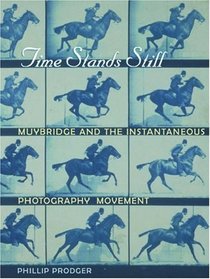Search -
Time Stands Still: Muybridge and the Instantaneous Photography Movement
Time Stands Still Muybridge and the Instantaneous Photography Movement
Author:
Eadweard Muybridge, one of the great pioneer-innovators of the 19th century, is a familiar figure to students of art history, photography, and cinema. Best known for the photographs of horses and other animals in motion that he made in the 1870s and '80s, Muybridge was the first person to use photography to freeze rapid action for analysis and s... more »
Author:
Eadweard Muybridge, one of the great pioneer-innovators of the 19th century, is a familiar figure to students of art history, photography, and cinema. Best known for the photographs of horses and other animals in motion that he made in the 1870s and '80s, Muybridge was the first person to use photography to freeze rapid action for analysis and s... more »
ISBN-13: 9780195149647
ISBN-10: 0195149645
Publication Date: 9/10/2003
Pages: 328
Rating: ?
ISBN-10: 0195149645
Publication Date: 9/10/2003
Pages: 328
Rating: ?
0 stars, based on 0 rating
Publisher: Oxford University Press
Book Type: Paperback
Other Versions: Hardcover
Members Wishing: 0
Reviews: Amazon | Write a Review
Book Type: Paperback
Other Versions: Hardcover
Members Wishing: 0
Reviews: Amazon | Write a Review
Genres:
- Arts & Photography >> Individual Artists >> ( M-O ) >> Muybridge, Eadweard
- Arts & Photography >> Photography & Video >> Collections, Catalogues & Exhibitions
- Arts & Photography >> Photography & Video >> Photographers, A-Z >> General
- Reference >> Publishing & Books >> Bibliographies & Indexes >> Art & Photography




